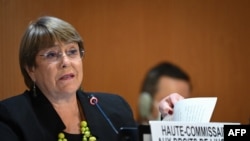The Taliban’s decision to dissolve Afghanistan’s Independent Human Rights Commission is a major setback for the country, say human rights groups and defenders.
Criticism came swiftly after Taliban authorities on Tuesday said the AIHRC and four other “unnecessary” departments had been axed in the face of a $500 million annual budget shortfall.
"Because these departments were not deemed necessary and were not included in the budget, they have been dissolved," Innamullah Samangani, the Taliban government's deputy spokesman, told Reuters.
“Nothing more than that can be expected” from the Taliban, which has a poor human rights record, said Mohammad Naim Nazari, former deputy head of the AIHRC.
“The Taliban do not recognize the rights of women, who constitute half of the population," he told VOA's Pashto Service. "They do not believe in freedom of speech and have imposed restrictions on media. … The Taliban do not recognize the rights of minorities.”
Calling Afghanistan's ruling Taliban “afraid” of human rights groups, Nazari described their style of governance as incompatible with formal humanitarian oversight.
The Taliban, however, defended Tuesday's decision, calling the department closures in keeping with a national budget "based on objective facts" and intended only for departments that had been active and productive.
Samangani, the Taliban spokesperson, also said the departments could be reactivated in the future "if needed."
But human rights advocates aren't optimistic. Many of them view Tuesday's announcement as a tragic reversal after 20 years of key improvements for human rights in the country.
“I am dismayed at the reported decision of the Taliban to dissolve the country’s Independent Human Rights Commission,” said U.N. High Commissioner for Human Rights Michelle Bachelet in a prepared statement.
Calling it “a massive setback,” Richard Bennett, U.N. special rapporteur on human rights in Afghanistan, described the commission's role as an independent, domestic mechanism for documenting and monitoring complaints "critical for human rights protection in #Afghanistan.”
Andreas Von Brandt, the EU ambassador for Afghanistan, called the Taliban’s decision “a step in the wrong direction” for national institutions that serve as vital points of connectivity with the outside world.
"Those bridges are being increasingly destroyed,” he tweeted. Their dissolution, he said, “excludes #Afghanistan from universally agreed rights and principles and is also strange for a country which relies heavily on international #foodaid and support.”
Also dissolved was the High Council for National Reconciliation (HCNR), the once high-powered National Security Council, and the commission for overseeing the implementation of the Afghan constitution.
The HCNR was last headed by the country’s one-time second-ranking government official Abdullah Abdullah, and was working to negotiate a peace between the U.S.-backed government of former President Ashraf Ghani and the then-insurgent Taliban.
Dissolving the institutions mean that thousands of professional Afghans have lost their jobs, said Abdul Qadir Zazai, a former member of the Afghan parliament, adding that “these people were trained for their jobs over the last 20 years.”
Founded in 2002 to document and report on human rights abuses throughout the country, the AIHRC lost seven of its employees “to violence and terrorism [most directly attributed to the Taliban] since its establishment,” tweeted former AIHRC chairperson Shaharzad Akbar.
The commission halted its activities after the Taliban regained power in 2021, and all its nine commissioners escaped the country fearing Taliban reprisals.
Former AIHRC commissioner Shabnam Salihi told VOA that although human rights violations continue to be reported via foreign groups such as Amnesty International and Human Rights Watch, the dissolution of Afghanistan’s only independent rights commission means many more violations are now expected to be overlooked.
“We hear people are tortured and killed. We hear about war crimes. At such a time, there is no organization to watch on the [Taliban] government,” Salihi told VOA.
Although AIHRC was unable to work under the Taliban, “it was an important institution for Afghanistan,” Heather Barr of Human Rights Watch told VOA.
“The Taliban, by abolishing this office, are saying very openly that they don't intend to comply with human rights," she added. "They're not interested in respecting Afghanistan's obligations under international law. And they don't care if people whose rights are violated have nowhere to go for help.”
The Taliban ruled Afghanistan from 1996 to 2001 with an iron fist and implemented a harsh version of Islamic rule, including banning women from education and work. After taking over last year, the Taliban assured the world they would be more moderate.
However, they have yet to allow girls to restart secondary school education and have also introduced rules that mandate that women and girls wear veils and require them to have male relatives accompany them in public places.
This story originated in VOA's Pashto Service. Some information is from Reuters.





